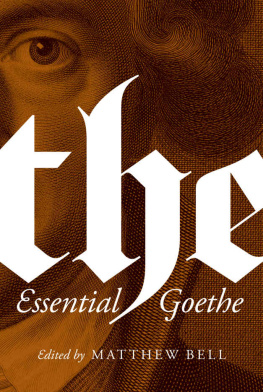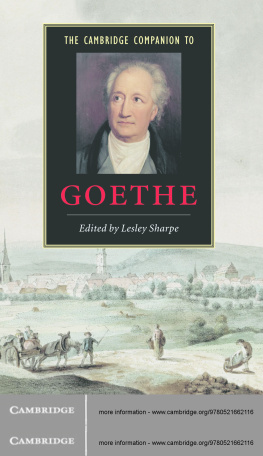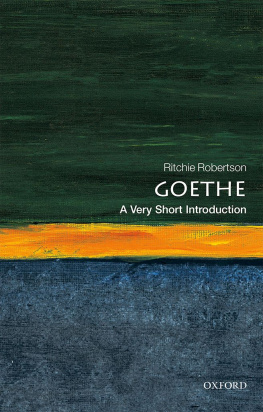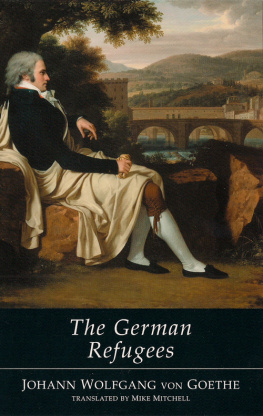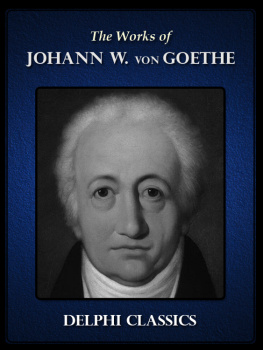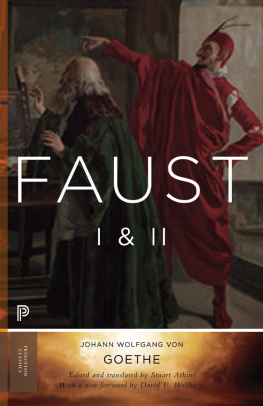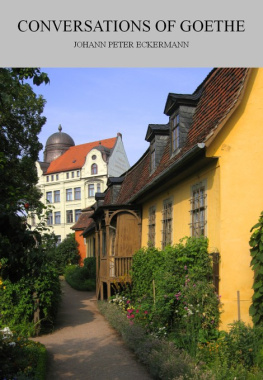Johann Wolfgang Goethe - Faust, Part Two
Here you can read online Johann Wolfgang Goethe - Faust, Part Two full text of the book (entire story) in english for free. Download pdf and epub, get meaning, cover and reviews about this ebook. year: 2008, publisher: Oxford Worlds Classics, genre: Detective and thriller. Description of the work, (preface) as well as reviews are available. Best literature library LitArk.com created for fans of good reading and offers a wide selection of genres:
Romance novel
Science fiction
Adventure
Detective
Science
History
Home and family
Prose
Art
Politics
Computer
Non-fiction
Religion
Business
Children
Humor
Choose a favorite category and find really read worthwhile books. Enjoy immersion in the world of imagination, feel the emotions of the characters or learn something new for yourself, make an fascinating discovery.

- Book:Faust, Part Two
- Author:
- Publisher:Oxford Worlds Classics
- Genre:
- Year:2008
- Rating:5 / 5
- Favourites:Add to favourites
- Your mark:
- 100
- 1
- 2
- 3
- 4
- 5
Faust, Part Two: summary, description and annotation
We offer to read an annotation, description, summary or preface (depends on what the author of the book "Faust, Part Two" wrote himself). If you haven't found the necessary information about the book — write in the comments, we will try to find it.
Faust, Part Two — read online for free the complete book (whole text) full work
Below is the text of the book, divided by pages. System saving the place of the last page read, allows you to conveniently read the book "Faust, Part Two" online for free, without having to search again every time where you left off. Put a bookmark, and you can go to the page where you finished reading at any time.
Font size:
Interval:
Bookmark:
 Great Clarendon Street, Oxford 0x2 6DP Oxford University Press is a department of the University of Oxford. It furthers the Universitys objective of excellence in research, scholarship, and education by publishing worldwide in Oxford New York
Great Clarendon Street, Oxford 0x2 6DP Oxford University Press is a department of the University of Oxford. It furthers the Universitys objective of excellence in research, scholarship, and education by publishing worldwide in Oxford New York
Athens Auckland Bangkok Bogot Buenos Aires Calcutta Cape Town Chennai Dar es Salaam Delhi Florence Hong Kong Istanbul Karachi Kuala Lumpur Madrid Melbourne Mexico City Mumbai Nairobi Paris Sso Paulo Singapore Taipei Tokyo Toronto Warsaw with associated companies in Berlin Ibadan Oxford is a registered trade mark of Oxford University Press in the UK and in certain other countries Published in the United States by Oxford University Press Inc., New York David Luke 1994 The moral rights of the author have been asserted Database right Oxford University Press (maker) First published as a Worlds Classics paperback 1994
Reissued as an Oxford Worlds Classics paperback 1998 Reissued 2008 All rights reserved. No part of this publication may be reproduced, stored in a retrieval system, or transmitted, in any form or by any means, without the prior permission in writing of Oxford University Press, or as expressly permitted by law, or under terms agreed with the appropriate reprographics rights organizations. Enquiries concerning reproduction outside the scope of the above should be sent to the Rights Department, Oxford University Press, at the address above You must not circulate this book in any other binding or cover and you must impose this same condition on any acquirer British Library Cataloguing in Publication Data Data available Library of Congress Cataloging in Publication Data Data available ISBN 978-0-19-953620-7 Printed in Great Britain by Clays Ltd, St Ives plc OXFORD WORLDS CLASSICSFor over 100 years Oxford Worlds Classics have brought readers closer to the worlds great literature. Now with over 700 titlesfrom the 4,000-year-old myths of Mesopotamia to the twentieth centurys greatest novelsthe series makes available lesser-known as well as celebrated writing. S. S.
Eliot, Graham Greene, and other literary figures which enriched the experience of reading. Today the series is recognized for its fine scholarship and reliability in texts that span world literature, drama and poetry, religion, philosophy and politics. Each edition includes perceptive commentary and essential background information to meet the changing needs of readers. Refer to the to navigate through the material in this Oxford Worlds Classics ebook. Use the asterisks (*) throughout the text to access the hyperlinked Explanatory Notes.OXFORD WORLDS CLASSICS JOHANN WOLFGANG VON GOETHE
JOHANN WOLFGANG VON GOETHE
 Translated with an Introduction and Notes by DAVID LUKE
Translated with an Introduction and Notes by DAVID LUKE  OXFORD WORLDS CLASSICS
OXFORD WORLDS CLASSICSFAUST
PART TWO JOHANN WOLFGANG GOETHE was born in 1749, the son of a wellto-do citizen of Frankfurt. As a young man he studied law and briefly practised as a lawyer, but creative writing was his chief concern.
In the early 1770s he was the dominating figure of the German literary revival, his tragic novel Werther bringing him international fame. In 1775 he settled permanently in the small duchy of Weimar where he became a minister of state and director of the court theatre; in 1782 he was ennobled as von Goethe. His journey to Italy in 1786-8 influenced the development of his mature classical style; in the 1790s, he and his younger contemporary Schiller (1759-1805) were the joint architects of Weimar Classicism, the central phase of German literary culture. Goethe wrote in all the literary genres but his interests extended far beyond literature and included a number of scientific subjects. Faust, written at various stages of his life and in a variety of styles, became a constantly enlarged repository of his personal wisdom. His creative energies never ceased to take new forms and he was still writing original poetry at the age of more than 80.
In 1806 he married Christiane Vulpius (1765-1816), having lived with her for eighteen years; they had one surviving son, August (17891830). Goethe died in 1832. DAVID LUKE was a Student (Fellow) and Tutor in German at Christ Church, Oxford, until 1988. He has edited and translated the Penguin Poets Goethe (1964) and the Oxford Worlds Classics Faust Part One (1987, awarded the European Poetry Translation Prize in 1989) and Erotic Poems (1997), as well as various other works of German literature including Heinrich von Kleists stories, the tales of the Brothers Grimm, and Death in Venice and Other Stories by Thomas Mann. 
I have assumed, however, that those who read this sequel, if such it is, will probably be acquainted with Part One in some form or another, and perhaps with my own version of it which was published by Oxford University Press in 1987. In this hope I here occasionally refer (by page or line or scene number) to the Part One text or to my introduction and notes to it. (In both translations I have preserved the standard line-numbering of the German text, and for greater clarity added editorial numbers to Goethes scenes; a scene-index appears on p. lxxxiii.) As with Part One, the German text is so well established that it makes no significant difference which of the many standard editions one translates from, but I have in fact used the relevant Reclam volume (Reclams Universal-Bibliothek, Stuttgart, 1986), which is itself based on volume 15 (Faust, II Teil, ed. Erich Schmidt, 1888) of the venerable Weimar Edition of Goethes works (1887-1919). 8, ed. 8, ed.
Gotthard Erler, 1965) of the more modern Berlin Edition, in which Goethes different Faust texts, peripheral writings, and other relevant material are presented in a rational and accessible way. The Weimarer Ausgabe and Berliner Ausgabe are referred to as WA and BA. For the complex problem of the genesis of Act V, which (as in the case of the genesis of Part One) must affect any interpretation of the conclusion and indeed of the whole of Part Two, an indispensable aid has been Ulrich Landecks recent text-critical edition of this Act (Der fnfte Akt von Goethes Faust II: kommentierte kritische Ausgabe, Artemis Verlag, Zurich 1981). As in the Part One edition, I have tried to condense what seemed to be the most important points for discussion into the introductory essay, using asterisks to relegate specific miscellaneous details to the Explanatory Notes; the Notes are placed after the text since they annotate it as well. They are also preceded by a few extracts from Goethes unpublished sketches and other material on the periphery of Part Two: the so-called paralipomena, which are, so to speak, a penumbral extension of his official text of
Next pageFont size:
Interval:
Bookmark:
Similar books «Faust, Part Two»
Look at similar books to Faust, Part Two. We have selected literature similar in name and meaning in the hope of providing readers with more options to find new, interesting, not yet read works.
Discussion, reviews of the book Faust, Part Two and just readers' own opinions. Leave your comments, write what you think about the work, its meaning or the main characters. Specify what exactly you liked and what you didn't like, and why you think so.

